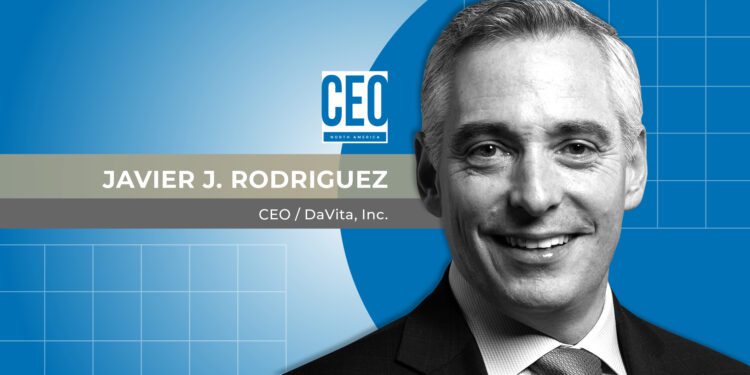

Javier J. Rodriguez
CEO / DaVita, Inc.
DaVita doesn’t just want to provide healthcare—it wants to change it. Led by business executive Javier Rodriguez, CEO, the kidney care enterprise is prepared to transform the industry, and it wants to do so by focusing on what matters most: people.
Javier Rodriguez, DaVita CEO, could boast about the company’s numbers: More than 3,000 dialysis centers in 12 countries, as of 2023. Nearly 250,000 patients served globally. More than $12 billion in annual revenue. These are impressive stats for the kidney care company.
But Rodriguez doesn’t like to focus on the numbers. The heart of the company, he said in an interview with CEO North America magazine, is the people and its mission to be the provider, partner, and employer of choice. When he joined DaVita more than 25 years ago, he wasn’t drawn to the logistics, the operations, or the potential for revenue—he saw it as an opportunity to change healthcare for the better.
“When anyone uses the healthcare system, you find some elements that you wish were different,” Rodriguez said in his executive interview. “When you get an opportunity to shape that, you make sure that you take it.”
Personalization and Prevention
From the very start of a person’s experience, healthcare isn’t an easy system to navigate. The first thing that a patient wants, Rodriguez believes, is more convenience. “The scheduling can be tough, and the waiting is inefficient,” he explained.
Then, it never feels personalized. “Once you do get in, they ask you the same set of questions that you’ve answered several times. It’s not connected to your other health experiences,” he added to his magazine interview. “If you’re anything like me, you don’t remember the medication that you were given at the doctor a year ago, or the procedure that happened three years ago.”
“Our philosophy is that we’re all in this together. No matter what the tests are—meaning hurricanes, pandemics, what not—our patients need to be treated.”


The team at DaVita wants to do something about that—not just the leadership, Rodriguez maintains, but also its 65,000+ employees (called teammates) “waking up every day trying to help their fellow human beings.”
No one wants a nurse or physician tied to their computer as they’re talking to patients, so the company thinks about creating efficiencies that eliminate the need for a provider to look at multiple screens to understand the patient’s needs. Rather, DaVita wants to make sure the practitioner has everything they need right at their fingertips, whether it’s details about the last time the patient experienced a health complication or the facts about a unique circumstance affecting the patient.
Additionally, Rodriguez said in his CEO interview he wants to shift the mindset from fixing a health issue to preventing a health issue. “Preventative care is a problem in the healthcare system,” he stated. “We usually wait for things to break, and then go to the hospital or doctor to get fixed.” At DaVita, they’re trying to change that paradigm. Instead of just reacting to a problem, its goal is to get involved early, work on prevention, and keep their patients as healthy as possible.
“The more engagement you have in the healthcare system, the bigger thirst you have for improvement.”


Innovations and Aspirations
Financially speaking, things are going quite well at DaVita. In its fourth-quarter 2023 earnings results, the company shared a revenue of $12.14 billion and an adjusted operating income of $1,734 million for the year, along with an operating cash flow of $2,059 million.
Its 2023 fourth-quarter revenue beat analysts’ estimates of $3.01 billion, coming in at $3.15 billion instead. On an adjusted basis, the company also surpassed analysts’ expectations for share profits, reaching $1.87 against a $1.59 expectation.
Additionally, in February of this year, the company forecasted a 2024 profit above Wall Street estimates, viewing a 2024 adjusted per-share profit between $8.70 and $9.80—an increase over the average analysts’ estimate of $8.68.
But when Rodriguez looks at DaVita’s opportunities for growth over the next three to five years, It’s not only about revenue. Instead, he said they have two high aspirations.
First, they’d like to add to the types of services that DaVita offers, from finding a way for transportation to be more convenient to cardiology to monitoring diabetes. “We could do a lot of things for our patients in a more streamlined and easier way,” Rodriguez shared.
Secondly, he looks to have a broader presence in the 11 other countries where the company currently operates—Brazil, China, Colombia, Germany, Japan, Malaysia, Poland, Portugal, Saudi Arabia, Singapore, and the United Kingdom.


In serving those communities, the medical providers document the best demonstrated practices across the globe, which are then shared with other centers worldwide. This helps DaVita deliver the best clinical offerings.
Additionally, “we want to be innovators,” the business executive elaborated. “We’re not comfortable with the status quo. We believe that we should set the pace, and hopefully the tide rises so that everyone can benefit.”
“We work hard, we’re curious about improvement, we surround ourselves with great people, and we assume that tomorrow will be better.”


Technology in Support of Patient Care
Rodriguez doesn’t have much interest in speaking about operational logistics, but he is proud of how DaVita’s investment in technology impacts patient care. The company works in a modern, cloud-based system that’s both intuitive to use and customized to ensure that every patient is being treated according to their needs. In 2023, DaVita’s Center Without Walls™ platform went live in every U.S. center.
The company now uses artificial intelligence in its systems, so it can monitor a patient’s details, such as lab values or how they are responding to medication, and adjust care as needed. He gives an example: DaVita’s patients who treat at home are using cyclers that provide information to a patient’s care team, “so we can make interventions in real time.”
“We can call you and say, ‘we just noticed that you have more fluid than normal or your weight is off,’ so please do the following things’” to adjust care, Rodriguez explained. “These are the things that we couldn’t do just two to three years ago.”


The goal of using this technology is to “work the metrics down,” he added in his CEO interview, so that instead of spending 12 days in a hospital, the patient is staying just seven, six or even only four days.
However, the technology needs to have excellent people using it. While every DaVita center has the same clinical platform, the same AI models, and the same protocols, they also have people who have been trained to make sure that the centers are meeting the company’s standards.
“Technology is absolutely a great tool,” Rodriguez said. “But at the end of the day, you have to remember that we don’t want to be treated by machines, we want to be treated by humans.”
And that, Rodriguez says, is why the heart of DaVita will always be the people.














